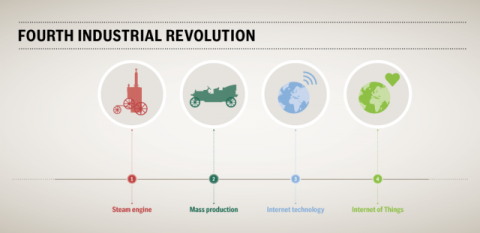Oct142016
Posted at 8:48 PM
U.S. Secretary of Commerce Penny Pritzker participated in a panel discussion hosted by the World Economic Forum (WEF) Center for the Fourth Industrial Revolution in San Francisco, California. WEF founder Klaus Schwab moderated the discussion between Secretary Pritzker and panelists Marc Benioff, Founder of Salesforce; Bernard J. Tyson, CEO of Kaiser Permanente; and Mike Wirth, Executive Vice President of Midstream and Development of Chevron.
During the 90-minute discussion, the panelists explored the implications of what WEF calls the “Fourth Industrial Revolution,” characterized by a fusion of technologies that is blurring the lines between physical, digital, and biological spheres. When compared with previous industrial revolutions, the Fourth is evolving at an exponential rather than a linear pace. Moreover, it is disrupting almost every industry in every country, and the breadth and depth of these changes herald the transformation of entire systems of production, management, and governance.
In sharing lessons learned from her tenure at the Department of Commerce and as a business leader, Secretary Pritzker advocated for government to actively foster innovation and entrepreneurship in new technologies. She noted that government must strive to operate at speeds that can keep up with the pace of change facing the people it serves.
In addition, Secretary Pritzker emphasized the need for public-private cooperation as technology continues to develop, especially in the fields of the Internet of Things (IoT) and manufacturing. She noted that while the private sector needs to lead on IoT, government can have a role to play if it adopts the speed and agility of the private sector. Moving forward, Commerce is working on an IoT Green Paper on the benefits, challenges, and potential role of government in fostering the Internet of Things.
Additionally, the Secretary noted that an important legacy of the Obama Administration where public-private cooperation is critical is manufacturing. For example, Manufacturing USA, a bold initiative undertaken to maintain America’s leadership and competitiveness in the manufacturing sector, was born from the idea the joint efforts of the public and private sectors can create and produce cutting-edge manufacturing technology to solve industry-relevant problems, strengthen the skills of America’s workforce, and secure U.S. leadership in emerging manufacturing technologies.
In response to the topic on agility of government regulations, Secretary Pritzker noted that with cybersecurity, for example, government cannot regulate cyber risk on its own. However, government can work with the private sector, specifically, business leaders, technical experts, and cybersecurity professionals – to better manage cyber risk. The Department of Commerce did this through NIST’s Cybersecurity Framework. The framework provides a common language of risk management, and is a good example of the agile, flexible, effective global partnerships that are necessary for governance in the 21st century.
Secretary Pritzker stressed that government can meet the demands of the Fourth Industrial Revolution. With the right leadership and support from Congress, the government can serve American businesses and communities better by operating at the speed of the 21st Century economy.


